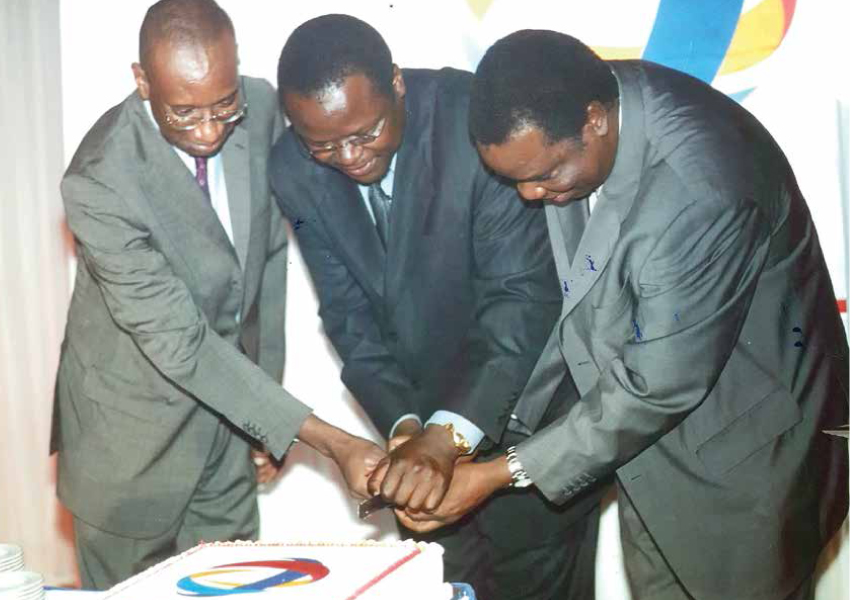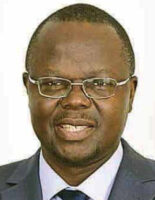
When it comes to loyalty, few men exemplify it as much as Ochilo George Mbogo Ayacko, whose decision to stick with his political mentor, Raila Odinga, saw him demoted from a powerful ministry to a less influential one, and then fired from President Mwai Kibaki’s Cabinet one short year later.
The soft-spoken but fierce political operator was part of Kibaki’s Cabinet during its most wobbly period – when ministers exchanged harsh words on numerous occasions and almost succeeded in dividing the country in two.
“It was the worst environment to work in. Our divisions disappointed Kenyans, who had put a lot of faith in us,” Ayacko recalled with regret and bitterness about the happenings of his time in the Cabinet – from 2003 to 2005 when he was summarily dismissed.
“Kibaki was a wonderful President. He truly wanted to make this country great. He gave ministers the latitude to execute their mandate. All he wanted was for us to demonstrate how what we did impacted the livelihoods of the common man. Then issues started showing up,” he said.
Kibaki was a wonderful President. He truly wanted to make this country great. He gave ministers the latitude to execute their mandate. All he wanted was for us to demonstrate how what we did impacted the livelihoods of the common man.
Ayacko blamed the infighting among Cabinet members, the broken memorandum of understanding that dealt a blow to the National Rainbow Coalition (NARC) that had won Kibaki the presidency in 2002 and the emotive 2005 referendum on changing the Constitution of Kenya as the main factors that compromised the gains of the revolution that had ended the previous regime’s grip on Kenya.
“As Opposition leaders, we had chased KANU (the Kenya African National Union party) out of power with high hopes of changing the country. When NARC became unstable, it was very painful for those of us who had come together to change Kenya,” he said.
Ayacko’s political career is entangled with that of his political mentor, Odinga – his national politics story started with Odinga’s rise. After breaking away from FORD-Kenya and leaving it with a faction led by Kijana Wamalwa in the 1990s, Odinga reactivated the National Development Party (NDP). Within a few months, he had established NDP and its tractor symbol (“Tinga”) as a new political force that would become the most dominant party in Luo Nyanza from 1997 to around 2002.
In the 1997 General Election, Ayacko, then a political novice and a fresh law graduate from the University of Nairobi, was among the new faces in NDP. He also became the diminutive figure that felled a giant when he defeated the flamboyant, eloquent and wealthy KANU-nominated Minister, Dalmas Otieno, in Rongo Constituency.
That election also saw an end to the era of a few KANU bigwigs in the region. They included Otieno, Wilson Ndolo Ayah and Lazarus Ombayi Amayo. Whereas Otieno lost to Ayacko, the veteran Ayah lost his Kisumu Rural seat to another newcomer, Ochoro Ayoki. After his win, Ayacko became one of Odinga’s most trusted lieutenants in the region.
In 1998, he was among the NDP MPs who voted against a no-confidence motion that had been moved against the government of Kibaki’s predecessor, President Daniel arap Moi. They argued that supporting the motion would have jeopardised their party’s chances of ascending to power peacefully. The other NDP MPs were Otieno Kajwang, Owino Acholla, Tom Onyango, Odhiambo Omamba and Shem Ochuodho.
The motion had been sponsored by James Orengo, who was then in the Social Democratic Party.
Following this, Ayacko was picked to be part of a select team comprising Kibaki (then the Leader of Opposition), Odinga, Mukhisa Kituyi, Oloo Aringo, Jimmy Angwenyi and Norman Nyaga that was tasked with conducting parliamentary reforms. The team’s objective was to fight for the autonomy of Parliament so it would stop appearing as if it was an appendage of State House.

It was this team that helped to establish the Parliamentary Service Commission and introduced the provision of offices for all MPs.
Ayacko also worked with a team under former Ol Kalou MP Muriuki Karue to come up with the Constituency Development Fund and was the chairman of the powerful Parliamentary Investment Committee for two years.
In the 2002 General Election, he was re-elected to Parliament on a NARC ticket and thereafter appointed Minister for Energy. His Assistant Minister was Mwangi Kiunjuri and the Permanent Secretary was Patrick Wanyoike.
His short tenure in the Energy docket – from 2003 to 2004 – brought widespread reforms to the sector, some of which led to international donors and the World Bank restoring their support through the Energy Sector Recovery Project after several years of an imposed freeze on support that had been occasioned by reports of corruption during the previous regime.
Ayacko was also credited with strengthening the operations of the Kenya Electricity Generating Company PLC (KenGen) after its unbundling from Kenya Power Company, and setting the steps for the establishment of the Rural Electrification Authority, created to speed up implementation of the rural electrification programme.
He also spearheaded the phasing out of leaded petrol with an initial deadline of December 2005.
The former Minister said President Kibaki was interested in three things in the energy sector.
“First, he insisted that we work to ensure that the cost of electricity tariffs was not raised. Second, he pushed to ensure that the cost of petroleum products, including fuel, did not go up and (third), he worked hard to ensure an increase in connectivity of electricity in rural areas.”
He said Kibaki also insisted that the cost of electricity generation should not be passed on to consumers.
The Kibaki government would also come up with the Energy Regulatory Commission, whose mandate it was to regulate the petroleum, electricity and renewable energy sectors away from political interference.
Despite orchestrating several reforms in the ministry, Ayacko did not last long as the wrangles in NARC increased. On 30 June 2004, President Kibaki executed his first major government reshuffle in which he added 18 newcomers to his Cabinet, including MPs from FORD-People and KANU, which were Opposition parties.
Although he did not fire any ministers from the increasingly intransigent Liberal Democratic Party (one of the parties under NARC), he transferred a number of them to less influential departments.
FORD-People leader Simeon Nyachae was appointed the new Minister for Energy and Ayacko was transferred to the Ministry of Sports, Gender and Culture, where he would last only one year before being fired from the Cabinet.
In his new docket, Ayacko introduced the Sports Policy that culminated in the Sports Act, and the Gender Policy and Act that came into law and led to the establishment of the Gender Commission. He also initiated the establishment of the National Sports Stadia Management Board and was involved in the successful bid to have the 2011 World Athletics Championships held in Kenya.
The 2005 referendum debacle ended his Cabinet career after Kibaki sacked all the ministers who opposed the government-backed draft Constitution. Ayacko was among the seven ministers who drove the ‘No’ campaign that was led by Odinga and Kalonzo Musyoka. The others were Najib Balala, William ole Ntimama, Anyang’ Nyong’o and Linah Kilimo.
The government faced such an embarrassing defeat that on 23 November 2005, Kibaki dissolved the entire Cabinet midway through its term, the first time in Kenya’s history such a thing was happening.
In the 2007 General Election, Ayacko contested the Rongo parliamentary seat against Otieno Anyango and his old rival, Dalmas Otieno, in a hotly-contested election marred by violent confrontations. Anyango’s head of security, Oricho Nyandere, was killed by supporters allied to Ayacko, which saw him lose the election to Dalmas, who won some sympathy from the electorate.
After the election, the Kenya South Sudan Liaison Office seconded Ayacko to South Sudan as a legal adviser to President Salva Kiir on legislative and constitutional matters. No long afterwards, Kibaki and his new partner in government, Prime Minister Raila Odinga, appointed him Executive Chairman and CEO of the Kenya Nuclear Electricity Board where he served until 2013. During that period he was also appointed a director at the Lake Basin Development Authority.
He would also be appointed as a commissioner with the African Commission on Nuclear Energy based in Addis Ababa, Ethiopia, and was later on elected to chair the commission.
Ayacko made a return to politics in 2017, vying for the Migori governorship against Okoth Obado. He lost the race and challenged the outcome in the High Court of Kenya. He lost and moved to the Court of Appeal, where his petition was dismissed.
In 2018, he was listed among nominees for an ambassadorial position but he declined as he was keen to continue pursuing his political ambitions. After the death of Migori Senator Ben Oluoch, Ayacko contested the position in the by-election and won.
The Senator traces his entry into politics to his days as a law student at the University of Nairobi. He was among the student leaders who from 1990 pushed for the return of the Student Organisation of Nairobi University (SONU), which culminated in the revival of the giant students’ union in 1992.
“I remember fighting for the revival of SONU with the likes of Ruaraka MP T.J. Kajwang. Before that, all the SONU leaders had been expelled and a number of them detained. After SONU was revived, we handed it over to the likes of former Mukurweini MP Kabando wa Kabando,” he recalled.
Born on 10 September 1968, Ayacko studied at several primary schools in Migori District (present-day Migori County) before joining Homa Bay Secondary School for his O’ levels. After doing his A’ levels at Alliance High School, he joined the University of Nairobi to study law. He also has a Masters in Law from the University of Nairobi, a Masters in Nuclear Law from the University of Montpellier in France and a PhD in Leadership and Change Management from the United States International University-Africa.
